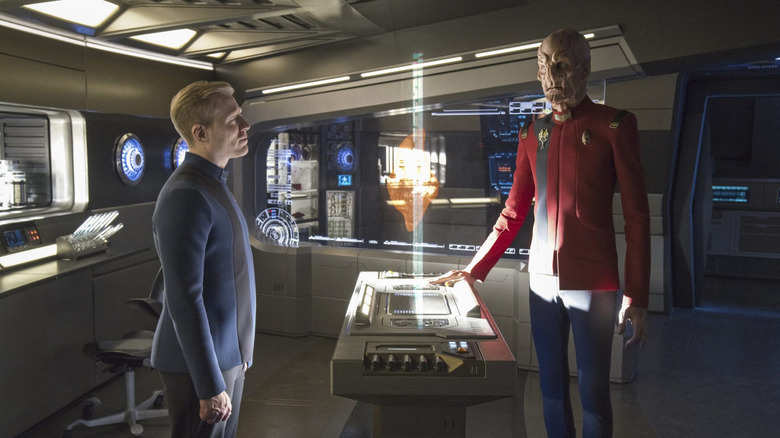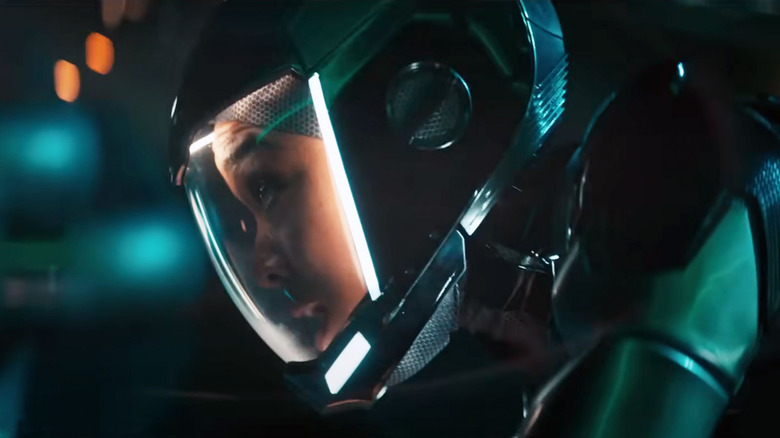Star Trek: Discovery Doubles Down On Being Itself In The Final Season, (And I'm Finally Okay With That) [SXSW 2024]
Watching the world premiere of "Star Trek: Discovery" season 5 in a packed theater at the SXSW Film Festival is enough to give even the most cynical Trekkie a case of the fuzzies. Supporting characters earned applause as they entered. Big action beats elicited vocal appreciation. Even small gags brought big laughs. I watched and listened as a "Star Trek" show that has sometimes left me, a lifelong follower of the franchise, frustrated and annoyed held its intended audience in the palm of its hand. That intended audience? Well... "Star Trek" fans who happen to love "Star Trek: Discovery," I suppose. I don't want to put anyone in a box, but this show has to be someone's favorite iteration of "Star Trek," and it was clear the audience was full of those folks.
I don't think I will ever fully love "Star Trek: Discovery," which has undergone massive overhauls during its five-season run but has stuck to several fundamental guns that don't quite work for me. But I've made peace with that, and this screening allowed me to crystalize exactly why — because this isn't my "Trek," but it's probably your "Trek," and that's fantastic. Everyone deserves their a "Trek" series that speaks to their heart and soul.
Every "Trek" fan brings their baggage, and that baggage informs what they want out of a "Trek" show. And for the folks that have embraced the warm, flashy, "heart dangling on the sleeve with such force that you might as well brace for an aerial spray" ethos of this show, the first episode of the final season doesn't course correct. It doubles down. This is a "Star Trek" that bravely decided to be its own self, and to continue being that show for viewers who love it even as others (loudly) complained. I admire the gumption. Despite the chaos that drove the show's infamously uneven first season, no one will accuse the show of not having a strong identity at this point.
Getting touchy-feely on the Bridge
I've always connected to "Star Trek" as a workplace show first and foremost, a franchise about doing your job, and doing it expertly, in space. Give me the calm, measured bridge crew meetings of "The Next Generation," with their incomprehensible technobabble and measured professionalism any day of the week. For me, it's still weird to watch the crew of "Discovery" so actively talk about their feelings, to treat each other like best buds at a slumber party, and to regularly weep and offer shoulders to cry on. "Aren't these people supposed to be work colleagues?" I'll grumble to myself, knowing that Captain Picard would absolutely not tolerate the casual shenanigans of Captain Michael Burnham's touchy-feely crew.
But I look at Burnham's crew and I get it. They're the most diverse "Trek" crew in history, and it's not even close. All "Trek" has folded its progressive viewpoints into the fabric of its storytelling (and it's been that way since 1966), but "Discovery" had the nerve to remove the obfuscation altogether. Non-white characters and gay characters and non-binary characters share the bridge together. It's clear "Discovery" feels a responsibility to these characters and their identities, and by extension, the younger fans watching their first "Trek" show in the age of streaming. Let them share their feelings. Let them cry. Let them be buddies who are always there with a compliment in a moment of darkness.
The people for whom these portrayals are intended need that sense of connection, of these diverse people living in a future where they can be comfortable and happy with their identities, more than I need "Star Trek" that feels like the shows I grew up with.
Boldly going into a big Trek mystery
And yes, the first episode of season 5 is heavy on the feelings, just about all of them warm and gushy. There's romance, BFFs, and even figures of authority being far kinder and more understanding than they would in other iterations of "Trek." But it's also big on action, scope, and adventure, building to a set piece that will make fans who look for the hard science in their "Trek" cock their head but it sure looks cool as hell. In the Q&A following the premiere, showrunner Michelle Paradise described this season as the "adventure season," and you can tell. There's a bounce to this season, a spring in its step that even those who haven't fully embraced the show can't help but appreciate. A small taste of some "Original Series" space western spirit.
There's a lot to talk about, and therefore a lot to spoil, so I won't go further. But fans looking for more direct connections to past iterations of the franchise will be pleased (or at least they'll appreciate the swing) when the crux of the show's overarching storyline comes into focus. Perhaps for the first time, the fully serialized nature of "Discovery" will work to its advantage. They're digging up a "Trek" storyline that has been lingering for a long time, and it's massive enough to perhaps warrant something beyond a two-part episode.
At this point, I admire "Discovery" more than I like it, but I love that other people love it. And I love that it's clear the show will only grow in stature as the years go on. It's taken too many big swings. It's been brave when it could have cowered. It took fans a long time to embrace "Deep Space Nine" as prrrobably the best series in the franchise. It took fans even longer to recognize that "Enterprise" is a vital building block of the franchise, even in its abbreviated state. "Star Trek: Discovery" is its own loud, proud thing. Not my cup of Earl Grey, but the final season is clearly going out on its own terms. And I love it for that.


